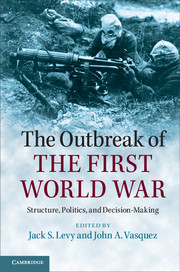Book contents
- Frontmatter
- Dedication
- Contents
- List of figures
- List of tables
- List of contributors
- Preface
- Part I Overview of debates about the causes of the First World War
- Part II Structure and agency
- Part III The question of preventive war
- 5 Restraints on preventive war before 1914
- 6 The sources of preventive logic in German decision-making in 1914
- 7 International relations theory and the three great puzzles of the First World War
- 8 Was the First World War a preventive war?
- Part IV The role of the other powers
- References
- Index
- References
8 - Was the First World War a preventive war?
Concepts, criteria, and evidence
Published online by Cambridge University Press: 05 July 2014
- Frontmatter
- Dedication
- Contents
- List of figures
- List of tables
- List of contributors
- Preface
- Part I Overview of debates about the causes of the First World War
- Part II Structure and agency
- Part III The question of preventive war
- 5 Restraints on preventive war before 1914
- 6 The sources of preventive logic in German decision-making in 1914
- 7 International relations theory and the three great puzzles of the First World War
- 8 Was the First World War a preventive war?
- Part IV The role of the other powers
- References
- Index
- References
Summary
The preventive motivation for war has long been a concern among political scientists and numerous scholars who have seen Germany as the key actor in bringing about the First World War. The clearest exponent of this position is Dale Copeland. In this analysis I want to raise the question of how we know when a given war should be characterized as a preventive war, providing evidence in support of a preventive theory of war. When a war is regarded as a preventive war varies by how scholars define that term. For some, the mere presence of a preventive motivation anywhere in the initiating state is sufficient. For others, the preventive motivation must be seen as the main causal factor making for the decision to go to war or for bringing it about. I outline some criteria for making this inference and apply them in detail to specific decision-makers within Germany in the summer of 1914. I argue that only when the preventive motivation is the primary cause of the war and other causes are either not present or clearly subservient can the war be seen as a preventive war.
Once Germany is treated, I briefly look at Austria-Hungary and its role as a basis for an alternate explantion of the war. The dynamics of the Austrian-Hungarian–Serbian case raises conceptual issues not present in the German case. Looking at this dyad and the others that enter in 1914 places Germany’s role within a larger context.
- Type
- Chapter
- Information
- The Outbreak of the First World WarStructure, Politics, and Decision-Making, pp. 199 - 224Publisher: Cambridge University PressPrint publication year: 2014
References
- 1
- Cited by



